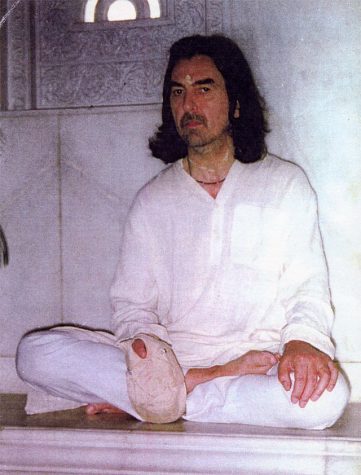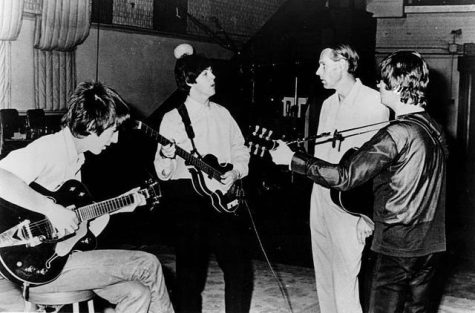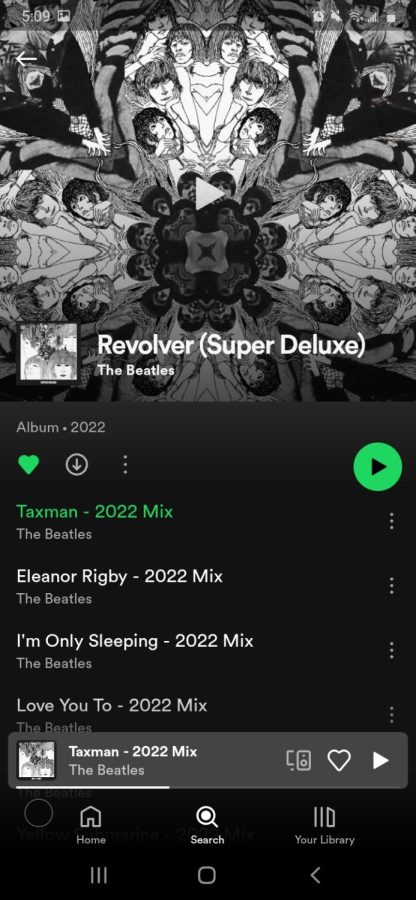Revolver: Acid, Religion, AI, and The Beatles
50 years have passed- how can you improve perfection?
The Beatles massive legacy can be viewed in many ways today. You may think of them as the shaggy haired men walking across Abbey Road, or the psychedelic Sgt. Pepper’s Lonely Hearts Club Band, their many quirky movies or children’s cartoons, or maybe you think of those four boys with matching hair and suits singing about holding hands and how clingy they are. But whatever you think of, the point that pivoted them from cute boy band to what we know as prolific, pioneering, innovative songwriters, was their 1966 album Revolver.
Don’t let the name alarm you, The Beatles come in peace. According to Paul McCartney, bassist and lead vocalist, the name comes from the idea that a record “revolves.”
The first most shocking thing about the recording of Revolver was it took them over 220 studio hours to record. For context, The Beatles usually spent about 80 hours in the studio recording an album, which isn’t very long but considering most of their time was spent on tour, it made sense. But touring was wearing on them. They were always clever musicians, but they felt limited from experimenting with their ideas. As a wildly popular guitar group, people didn’t expect much from them, and they certainly didn’t take them seriously with their audience of preteen girls screaming over every word. They were only in their mid-twenties, and they were changing a lot as people.

Their lead guitarist George Harrison, especially, made the biggest change. Always the baby of the group, he was finally coming into his own and discovering his individual talents and interests. During the recording of a scene in their 1965 film Help!, he discovered classical Indian music and it led into his interest in Hinduism and exploring his religious beliefs. Taught by classical musician Ravi Shankar, Harrison learned sitar, which figures frequently in most songs he recorded for this and “Norwegian Wood” from their previous album, Rubber Soul. His song, “Taxman,” opened the album, the first and only album to feature three songs penned by Harrison, much less opened by him.
Since folk singer Bob Dylan introduced them to marijuana in 1964, The Beatles’ music was slowly gaining influence from their increasing drug use. Their use of LSD sparked a lot of controversy and shifted the image people had of The Beatles. However, said drug use gave them inspiration for many of the songs on this particular album.
Revolver is a wonderful album, and it’s one of my favorites. I’m not the only one, though: the Vatican ranked it #1 on their top ten albums. That’s right, the pope likes LSD-influenced music. It also includes such classics as “Yellow Submarine”, “Eleanor Rigby” and But an issue that’s been frequently brought up by fans and critics alike is the dizzying mixing. The instruments and the vocals are completely split left and right. It’s a shame you can’t listen to some of the prettiest songs ever written without getting a migraine.
To form an unbiased opinion on the 2022 album, I organized a playlist in which alternating songs were remixes and 2009 remasters. As I listened to it, I noticed the ones I preferred were the 2022 remixes. They’re clearer, split evenly, and overall providing a more immersive sound without taking away from the original charm of the songs.

Peter Jackson, legendary director of the Lord of The Rings trilogy, developed an AI to remaster and separate tracks of master tapes. He used this on a documentary of the Let It Be footage filmed in 1969 that he edited into a cohesive 9-hour documentary called “Get Back.” Giles Martin, son of George Martin, the Beatle’s original record producer and music arranger, was inspired by Peter Jackson’s remastering technique and realized he can use it for the band’s creative peak. Like I’ve said before, the original mixing on Revolver does not hold up today, as most of the vocals are drowned out by the instruments and many other problems. Using Jackson’s AI, Giles cleaned up the master tapes and remixed them to the 2022 mixes released this October.
I love the new 2022 remixes, and I’m excited to see what else they come out with. Others, such as children’s rock band performer Mike Batt of The Wombles, don’t like this new trend of remixing Beatles albums. He expressed his distaste of remixes by destroying the master tapes of his old songs and saying, “I’ve destroyed many of the original multi-track tapes for The Wombles and my solo albums so people can’t [mess] around with them after I’m gone. I mixed them as I wanted them, not how some corporation or great-grandchild might like to remix them when I’m not around.” Although I’m not sure we can’t live without remixes of old British children’s songs about the importance of not littering, he does bring up a good point. But Paul McCartney and Ringo Starr, the surviving Beatles, don’t seem to mind. In fact, McCartney has used Jackson’s AI for a duet with the late John Lennon.
As there have been multiple others such as The White Album, Sgt. Pepper’s Lonely Hearts Club Band, and Let It Be, mega-fans and new fans alike just eat this kind of thing up (including me), so whether you like it or not, Mike Batt, there will be more to come.




